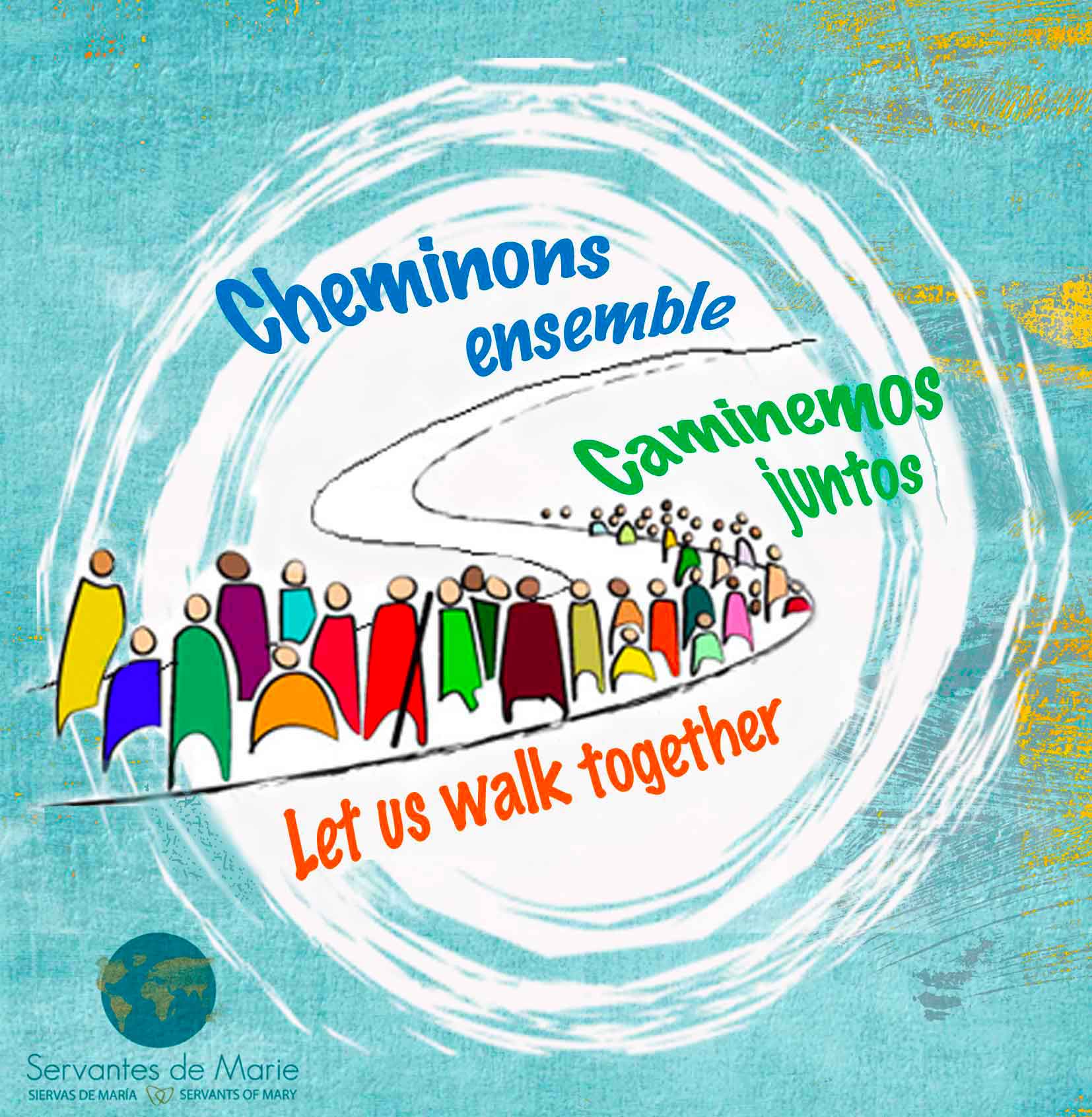 Let's walk together - Letter December 2023
Let's walk together - Letter December 2023
Dear readers.
Here is this year's third letter on the theme: "Let us be Hope".
We offer you various texts and testimonies to nourish your reflection.
Hope for better days have always led to the migration of people.
This is the main theme of this letter.
"Argentina y sus grandezas", Argentina and its greatness
In 1910, the Spanish writer Blasco Ibañez published a book entitled "Argentina y sus grandezas". The first chapter is entitled "Con rumbo a la esperanza", which means "Heading towards hope". Here is an extract:
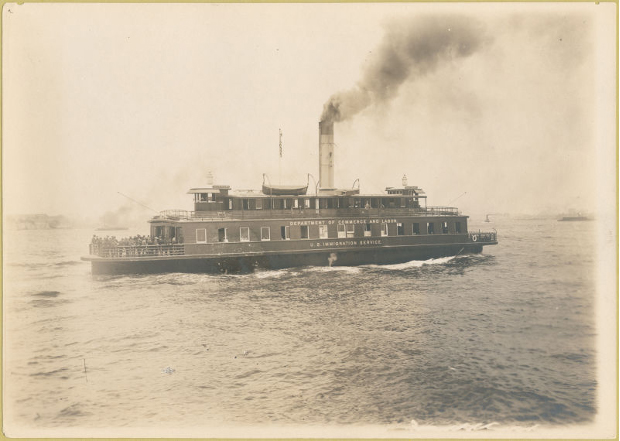 "Europe loses a part of its population every year, in numbers insignificant in relation to the large human population that inhabits this land, courageous for the energetic initiatives it takes to leave its homeland and head for the unknown.
"Europe loses a part of its population every year, in numbers insignificant in relation to the large human population that inhabits this land, courageous for the energetic initiatives it takes to leave its homeland and head for the unknown.
Every week, huge ships leave its shores, puffing smoke and launching themselves across endless blue solitudes, their bulging bellies filled with people who suffer, tremble, dream or tremble with the inner wonders of hope. They come out of the frozen quays and the foggy seas of the Baltic, from English ports black with coal dust, in whose greasy atmosphere seems to spread a vague perfume of tea and opium tobacco; from the coasts of oceanic France, which contrasts between the living banks of shellfish and the dark pine forests from its heaths to the furious assaults of the ferocious Bay of Biscay ; Spanish beaches, huge, calm blue bays over which seagulls flap their white wings, as if frightened by the inopportune cry of a crane or the mooing of a siren...
They entered like a net of poverty and hope; different races, different births; confused by poverty, driven by adventure...
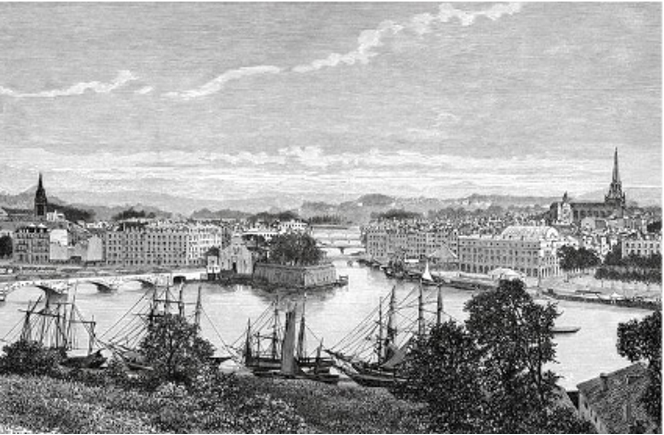
Buenos Aires, whose name merges with that of the whole of Argentina in the simple imagination of many people, it signifies fortune through hard work. Buenos Aires! The name is the stuff of dreams for the desperate."
What mysterious power makes this name circulate throughout Europe?
It touches on the theme of emigration. From the port of Bayonne, many Basques left for Latin America, full of hope. The Montevideo quay remains as a trace of these Basques who, on their arrival, were called "the Bayonnais".
Hope for better days has moved and moved many peoples throughout history, for a variety of economic, political and persecution-related reasons.
The story of Hagar in the Bible
Maïté Irazoqui has studied the life of this woman, excluded and promised certain death with her son. She offers us this text entitled "God dwells in the desert". As in the case of Father Cestac, prayer and trust in God were a source of hope.
A woman, a servant, became a mother so that her master could have a child, and then she was sent away with this son by this same master who had become a father. The woman's name was Hagar, her master's name was Abraham and their son's name was Ishmael. Mother and son set off into the unknown, with the feelings associated with being sent away, rejected and deprived.
Book of Genesis Chapter 21 in the Bible says this:
"Abraham rose early in the morning, took bread and a skin of water, and gave them to Hagar. He put the child on her shoulder and sent her away. She wandered off into the desert of Beer-Sheba.
When the water in the wineskin had run out, she laid the child under one of the shrubs. Then she went and sat down in a corner, at the distance of a bow range. She was saying, "I don't want to see the child die! Sitting apart, she raised her voice and wept.
God heard the boy's voice and the angel of God called Hagar from heaven. He said to her: "What is the matter with you, Hagar? Do not be afraid, for God has heard the boy's voice where he is. Get up! Raise the boy and hold him by the hand, for I will make him into a great nation. God opened her eyes and she saw a well with water. She went to fill the skin and made the boy drink.
God was with the boy, and he grew up and lived in the desert. He was an archer; he lived in the desert of Paran, and his mother made him marry a woman from the land of Egypt."
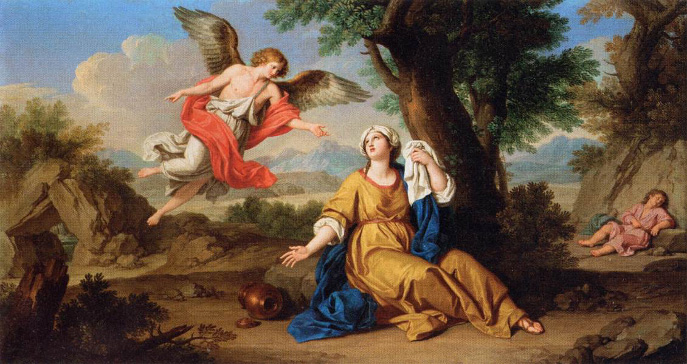
Mother and son wander in the desert. They have no goal, except perhaps to live. But is it possible to live in the desert, a place that is inhospitable because it lacks water? Water is as essential to life as the air we breathe. In fact, the story says it well: "
When the water in the wineskin ran out, she threw the child under one of the bushes". The exhaustion of the water provokes the gesture of despair: "
She threw the child", but her discernment remains, because she chooses the place: "
Under one of the bushes", the one that can give shade and protection, and the fact that she "throws" does not mean that she loses interest in the adolescent who has become a child again in this scene, but that she is at the limit of what she can do as a life-giving mother. The exhaustion of the life-giving water means death, which is the inevitable separation. Hagar knows that death will take her son. This is the climax of her distress: "
May I not witness the death of the child", she cries out. And Hagar, the mother, acts again, using her last appeal: "S
he raised her voice and wept". This expression denotes immense sorrow, supplication and total surrender to someone other than oneself. It's abandonment in the sense of giving way to another; it's the passing of the relay. These days we often talk about "letting go".
And God listens.
God is the one who hears the voice that did not cry out, the voice of the weakest, the voice of the one who is Hagar's reason for living. Through a very delicate interplay of echoes, Hagar's voice becomes the boy's voice in God's ears. God does not separate mother and son in this extreme situation, which is the nerve center of the mother's distress. On the contrary, he is quick to reassure the mother: "Fear not, God has heard the boy's voice where he is". Hagar raised her voice and God acted. He acted immediately, appropriately, fully and adequately. He calls on Hagar to act too. He confirms her in her role as mother: "Get up, lift up the child, hold him by the hand". God's requests are neither extraordinary nor out of the ordinary, but they change the way we look at things: "He opened her eyes". The God who sees opens Hagar's eyes because she sees a spring. He gives her "the means of her mission", as we would say today.
This change of outlook introduces a new beginning and a new perspective. It does not erase the past, it does not erase the reality of the desert; it gives the assurance of the presence of God. "God was with the boy", and Hope is there.
Welcoming young migrants unaccompanied at Notre Dame du Refuge

Sister Louisette Etchart's testimony...
In response to a call from the Department Council, the Association Mission Père Cestac opened and organized a "Reception Facility for Unaccompanied Minors". Since 2019, some places and various structures have been offered to Unaccompanied Migrant minors. Latchague welcomes around fifteen migrants in the P.A.O. ("Reception and Orientation Centre") section.
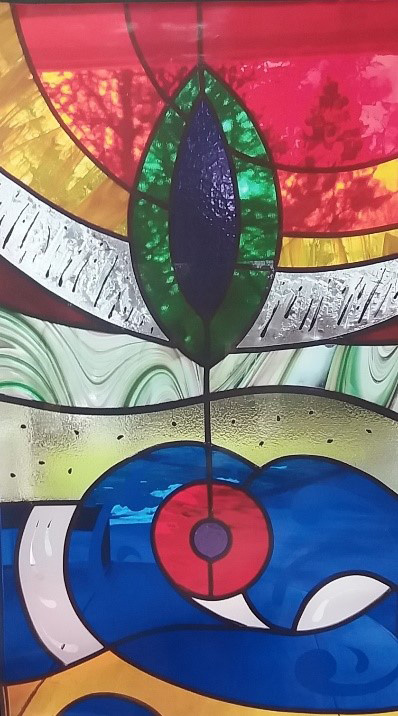
These young people talk not only about their "journey", but above all about their desires and their future. Here are some of their expressions:
"When I think about my future, life is a book to be written. I want to run non-stop to become a footballer... Everyone will watch me on TV! Then I want to go back to my native country... If I want to see my future, I have to work through someone to succeed. To succeed: respect, integrity, dignity!"
"I want to study, to succeed in my life... And to see my mother again. It's been a long, long journey... Guinea, Mali, Algeria, Morocco, and then the sea, Spain... Now I'm in France, I want to succeed and be reunited with my family."
"I want to become a welder! It's my dream...I have the confidence to do it. At the beginning of August, I started my journey to France, and the troubles began... But it was all to live, to have a more 'comfortable' life, to have a house, a family. I started to study, to learn French, I want to continue, to finish my studies... Work, work to achieve my dreams."
"I want to become a tiler or a plumber; I love these jobs! I'll never give up, because I want to go back to Guinea to see my mum, I miss her so much!"
New mission of Servants of Mary in North India: a ray of hope
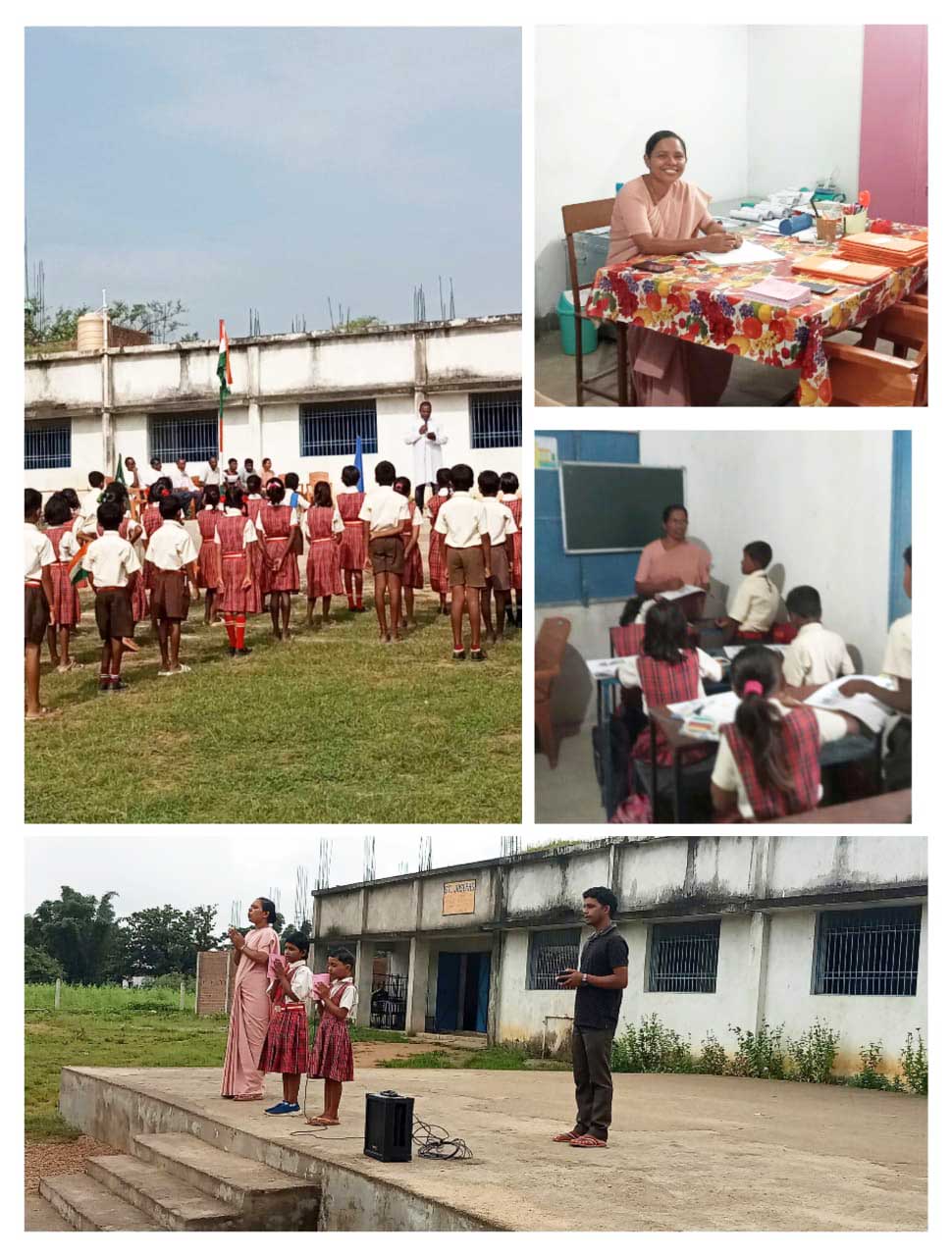 Hope always helps us to move from darkness to light, or to move forward.
Hope always helps us to move from darkness to light, or to move forward. In our lives, every day and every moment are a ray of hope, because every moment brings us new life and new hope. We, the servants of Mary, have been sent to the north of India, to the state of Chhattisgarh, for a new mission, to be a ray of hope for the people.
We are sent among the poor and the poorest. Here, the people are indigenous tribes who speak their own language, based on Dravidian. They are very simple and welcoming. In our community, we are three sisters and we are all involved in education in a diocesan school, St. Joseph's English medium school, known as the mission school.
A few words about the school: we have classes from nursery to sixth standard and English is the language of instruction. The school also upgrades every year. The school currently has 210 pupils. Nearly 90% of them belong to different tribes. Around 70% of the children are Catholic.
We welcome children from all backgrounds, regardless of caste, creed or religion. We try to educate them using a holistic approach. We form them with kindness and firmness according to the vision of Father Cestac. Their overall development is taken care of.
Although the official language is Hindi, the people speak their own mother tongue. As they belong to tribal groups, they are imbued with a certain discipline and rhythm of life. Music and dance are part of their lives and they celebrate and enjoy life.

They are farmers and crops are grown seasonally. The main crop is rice. It is the main food and the only source of income for the majority of the population. People are satisfied with simple or naturally available things. The work is done by them, although each family has its own land and they help each other to finish the job. They use natural fertilizers and are not greedy.
Nowadays, most of the young people in the families go out to look for work in the southern states and the big cities. They are unskilled workers. Their houses are big and long, made of mud walls, but very neat and clean.
Our parish has around 450 Catholic families spread over 18 villages within a radius of 18 to 20 km. It is not possible to reach them other than by two-wheeler or car. With the parish priest, we regularly visit houses and distribute communion to the sick and elderly.
This is our first experience in the North, so we're still learning. We need to understand their culture, their way of life, their language, and so on. We're very happy to be working for and with them. We're also finding it difficult to communicate with them, so we're gradually learning their language. This region has vocations for religious life, and we have three candidates who are staying with us. This place is a ray of hope for our Congregation. To conclude, we say that we are here to be a sign of hope like Mary our Mother who brought Jesus, the light of the world for the salvation of all mankind.
On the road to Christmas
To accompany us in this time of Advent, a Christmas prayer entitled "A true Christmas of hope":

Look to the star of hope,
It will show you the road to serenity
even in the midst of suffering, absence and fear...
Listen to hope,
It will tell you that Jesus came out of love for you...
Live hope, the gift of the spirit,
You will accept your poverty and your limitations in peace.
Speak of hope,
You will be a witness of life.
Be rooted in Jesus's hope,
through Mary's yes, you will live happily...
Christ is present, he offers you his tenderness.
Welcome his joy.
It's Christmas!
"When we are lost, driven from the places where we were safe, threatened by everything that threatens us, we can be sure that God, who hears Ishmael weeping, also hears us weeping in our distress and shows us, as he did for Hagar, the way to a spring where we can regain our strength", as Pastor Francis Minal wrote in a sermon on Genesis 16.
A Merry Christmas to all, and all the best for the New Year!
Let's be sowers of hope...

 Let's walk together - Letter December 2023
Let's walk together - Letter December 2023 Let's walk together - Letter December 2023
Let's walk together - Letter December 2023 "Europe loses a part of its population every year, in numbers insignificant in relation to the large human population that inhabits this land, courageous for the energetic initiatives it takes to leave its homeland and head for the unknown.
"Europe loses a part of its population every year, in numbers insignificant in relation to the large human population that inhabits this land, courageous for the energetic initiatives it takes to leave its homeland and head for the unknown. 
 Mother and son wander in the desert. They have no goal, except perhaps to live. But is it possible to live in the desert, a place that is inhospitable because it lacks water? Water is as essential to life as the air we breathe. In fact, the story says it well: "When the water in the wineskin ran out, she threw the child under one of the bushes". The exhaustion of the water provokes the gesture of despair: "She threw the child", but her discernment remains, because she chooses the place: "Under one of the bushes", the one that can give shade and protection, and the fact that she "throws" does not mean that she loses interest in the adolescent who has become a child again in this scene, but that she is at the limit of what she can do as a life-giving mother. The exhaustion of the life-giving water means death, which is the inevitable separation. Hagar knows that death will take her son. This is the climax of her distress: "May I not witness the death of the child", she cries out. And Hagar, the mother, acts again, using her last appeal: "She raised her voice and wept". This expression denotes immense sorrow, supplication and total surrender to someone other than oneself. It's abandonment in the sense of giving way to another; it's the passing of the relay. These days we often talk about "letting go".
Mother and son wander in the desert. They have no goal, except perhaps to live. But is it possible to live in the desert, a place that is inhospitable because it lacks water? Water is as essential to life as the air we breathe. In fact, the story says it well: "When the water in the wineskin ran out, she threw the child under one of the bushes". The exhaustion of the water provokes the gesture of despair: "She threw the child", but her discernment remains, because she chooses the place: "Under one of the bushes", the one that can give shade and protection, and the fact that she "throws" does not mean that she loses interest in the adolescent who has become a child again in this scene, but that she is at the limit of what she can do as a life-giving mother. The exhaustion of the life-giving water means death, which is the inevitable separation. Hagar knows that death will take her son. This is the climax of her distress: "May I not witness the death of the child", she cries out. And Hagar, the mother, acts again, using her last appeal: "She raised her voice and wept". This expression denotes immense sorrow, supplication and total surrender to someone other than oneself. It's abandonment in the sense of giving way to another; it's the passing of the relay. These days we often talk about "letting go". Sister Louisette Etchart's testimony...
Sister Louisette Etchart's testimony... These young people talk not only about their "journey", but above all about their desires and their future. Here are some of their expressions:
These young people talk not only about their "journey", but above all about their desires and their future. Here are some of their expressions: Hope always helps us to move from darkness to light, or to move forward. In our lives, every day and every moment are a ray of hope, because every moment brings us new life and new hope. We, the servants of Mary, have been sent to the north of India, to the state of Chhattisgarh, for a new mission, to be a ray of hope for the people.
Hope always helps us to move from darkness to light, or to move forward. In our lives, every day and every moment are a ray of hope, because every moment brings us new life and new hope. We, the servants of Mary, have been sent to the north of India, to the state of Chhattisgarh, for a new mission, to be a ray of hope for the people.  They are farmers and crops are grown seasonally. The main crop is rice. It is the main food and the only source of income for the majority of the population. People are satisfied with simple or naturally available things. The work is done by them, although each family has its own land and they help each other to finish the job. They use natural fertilizers and are not greedy.
They are farmers and crops are grown seasonally. The main crop is rice. It is the main food and the only source of income for the majority of the population. People are satisfied with simple or naturally available things. The work is done by them, although each family has its own land and they help each other to finish the job. They use natural fertilizers and are not greedy. 